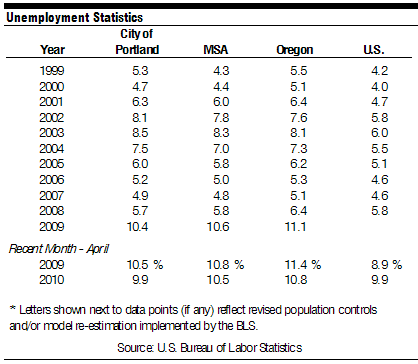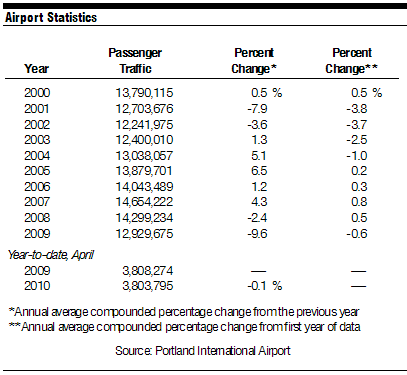
Economic Snapshot
Situated between the Cascade Mountains and Oregon’s Pacific coastline, Portland’s penchant for clean technology and green building earned it recognition as “America’s Greenest City”1 and “America’s Most Sustainable City”2 in 2008. Sustainability has remained a focus for Portland, where a high quality of life, mild climate, and vibrant arts scene have attracted young, educated job seekers in recent years.
Heavy job losses in the timber and agricultural sectors over the last 30 years prompted the move toward more sustainable industries. Like its western seaboard neighbors Seattle and San Jose, Portland enjoyed an economic boost from the emergence of the high-tech industry, especially the area’s largest employer, Intel Corp. Nike, Colombia Sportswear, and Adidas America have also fortified the area’s economic base. But despite success in transitioning to an economy focused on technology and sustainable living, Portland has not been spared from the nationwide economic downturn, ranking 17th for the highest percentage of job losses among the nation’s 100 largest labor markets.3 The recession of 2001-2002 also hit the Portland job market harder than most other U.S. metro areas. However, the most recent comparative period illustrates an improvement.

Another area of concern for Portland’s economy is the potential for further declines in residential real estate prices, although prices have recently begun to stabilize. The median sale price for residential real estate in Portland has dropped nearly 11% from a peak in August of 2007.4 In May of 2010, commercial real estate vacancies stood at close to 12%, the highest level in five years.5 The U.S. General Services Administration recently leased 263,000 square feet of office space downtown, but Portland’s CBD and suburban office markets, tenanted mostly by a swath of small- and medium-scale businesses, will remain depressed until the economy recovers in force.
Airport Activity
Traffic at Portland International Airport has declined, in part because some airlines, under pressure to cut costs, have discontinued service from the mid-sized Portland market. This has affected both international and domestic travel; Lufthansa Airlines ceased operations of its non-stop Portland to Frankfurt flight in September of 2009.6
Airport expansions and upgrades as part of a $500-million improvement program are still underway. Historically, the airport has contributed $5 billion into Oregon’s annual economy, but until commercial and leisure travel return to pre-recession levels, airport-related revenue will continue to decline.

Hotel Performance and Supply
Portland’s lodging market saw its share of hardship in 2009. In September, Portland was rated 5th in the country for how fast its hotel rates had fallen.7 One indication of the struggles facing Portland hotels is Hilton’s decision to close one of its downtown properties for certain weeks in the fall and winter to save on utility costs and maintenance.8 New hotel construction has slowed significantly, with plans to develop a 600-room hotel at the Oregon Convention Center indefinitely on hold. The project’s predevelopment cost was to be largely funded by tax revenues, but those revenues are expected to fall by 20% in the next two years.9 The lack of a convention headquarters hotel puts Portland at a disadvantage when competing against other large cities in the region for large conventions.
Rooms supply in Downtown Portland stands at 5,510, according to a September 2009 survey by The Dundon Company. The addition of new hotel supply in 2008 and 2009 has hastened the deterioration of existing hotels’ average daily rates, with extensive rate competition as each hotel attempts to capture its fair market share. The additional rooms and declining demand have also hurt market-wide occupancy levels, a situation familiar to many mid-sized metropolitan markets across the nation.
The Nines, a 331-room Starwood Luxury Collection hotel, opened in October of 2008. Developed on the top nine stories of the historic Meier & Frank Building, The Nines is one of Portland’s architectural gems. Fitting for sustainability-driven Portland, the hotel received a LEED Silver Certification from the U.S. Green Building Council in May of 2009. The hotel’s green features include a water-saving plumbing system, use of wind power, Green Seal-certified cleaning products, and eco-friendly building components such as paint and sealants. Reportedly, some 90 percent of the waste created during the hotel’s construction was sent for reuse or recycling instead of to a landfill.10
The luxury travel set has been more subdued in the recession, and The Nines has not been immune to the drop in demand. Muted high-end travel and increased rate sensitivity have stifled revenue streams for the hotel and reportedly delayed loan payments to the Portland Development Commission.11 Nonetheless, the latest data reveal that RevPAR recovery for luxury hotels nationwide has outpaced other chain-scale segments over several consecutive months. If trends continue in this direction and the improving economy frees up discretionary dollars, The Nines and other luxury properties in Portland will be in a good position to take advantage.
Another ultra-chic hotel addition to the Downtown Portland lodging market is the Hotel Modera, which opened mid-year 2008. The Hotel Modera underwent a multi-million-dollar renovation that retrofitted the old Portland Inn City Center. The 174-guestroom property is situated near Tri-Met’s Green Line, which accesses Union Station and Portland State University.
The newest hotel in the Portland market is a 256-room Courtyard by Marriott. The hotel, which opened in May of 2009, is situated in Downtown Portland’s Pearl District.
Conclusion
Portland remains a vibrant city, despite having been hit with the national economic woes. Recent signs of improvement in the area’s unemployment rate provide hope of a turnaround in 2010. Until demand picks up, financing will be kept at bay and hotel development will remain stalled, with few new projects in the planning stages. Portland’s economic diversification should minimize the peaks and valleys of past cycles, and investments in electronics manufacturing and alternative energies are intended to provide the area with a more stable source of employment over the long term. These sectors, once the economic recovery takes hold, should also provide more consistent demand for area hotels. Hence, while the near-term outlook remains cautious, Portland has the resources in place for strength in the years to come.
1 “America’s 50 Greenest Cities.” Popular Science,
www.popsci.com/environment/article/2008-02/americas-50-greenest-cities?page=1
2 “2008 U.S. City Rankings.” Sustain Lane,
www.sustainlane.com/us-city-rankings/
3 “Portland #17 of Cities with Job Losses.”
www.portland.bizjournals.com/portland/stories/2009/10/26/daily39.html?surround=lfn
4 “Existing Home Listings Statistics for Portland, Oregon.”
www.housingtracker.net/asking-prices/portland-oregon/
5 “As Businesses Shift Locations, Office Vacancy Nears 12 Percent.” The Portland Press Herald,
www.pressherald.com/special/pph_history/as-businesses-shift-locations-office-vacancy-rate-nears-12__2010-05-22.html
6 “Lufthansa will end Portland-Frankfurt Flight.”
www.oregonlive.com/business/index.ssf/2009/07/lufthansa_to_end_portlandfrank.html
7 “Hotel rates falling fast in Portland.”
www.portland.bizjournals.com/portland/stories/2009/09/21/daily34.html?s=industry&i=travel
8 “Portland’s hotels face grim prospects.”
www.oregonlive.com/business/index.ssf/2009/09/portlands_hotels_facing_grim_p.html?loc=interstitialskip
9 “Portland convention center hotel is dead.”
www.oregonlive.com/gresham/index.ssf/2009/09/portland_convention_center_hot.html
10 “What’s New in Portland, Oregon—2010.”
74.125.155.132/search?q=cache:1Yvx_HHkkIEJ:www.travelportland.com/media/whats_new.html+new+hotel+openings+portland+oregon&cd=8&hl=en&ct=clnk&gl=us&client=firefox-a
11 “Difficult Times for The Nines.”
www.oregonlive.com/business/index.ssf/2009/03/difficult_times_for_the_nines.html

Hi, i wanted to check with you, if you process market intelligence report for the hospitality sector in Mumbai. If yes, it would be great if you can mail me the sample copy of the report along with the quotation. Regards, Saviorina
Dear Saviorina, Thanks for writing. While I have not personally conducted work in Mumbai, the HVS offices in New Delhi and Mumbai perform hotel appraisals, market studies, and other hospitality services throughout India. Achin Khanna wrote the following article on the Mumbai market in August 2009: http://www.hvs.com/article/4130/mumbai-the-comeback-city/. He may be able to advise you on the state of the Mumbai market or assist with any studies you need. Hope this helps! Sincerely, Kasia